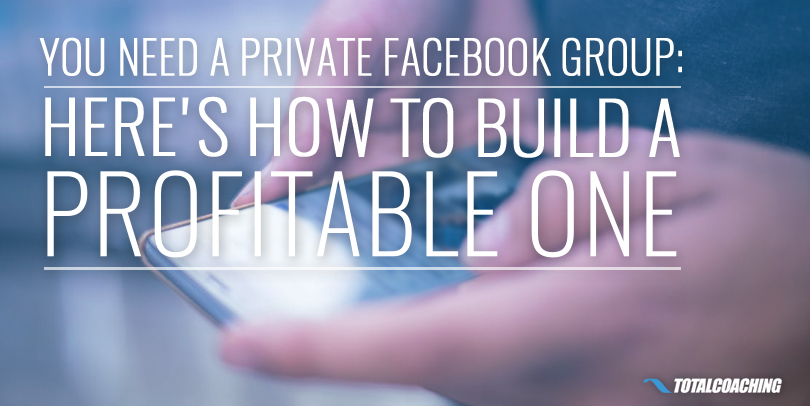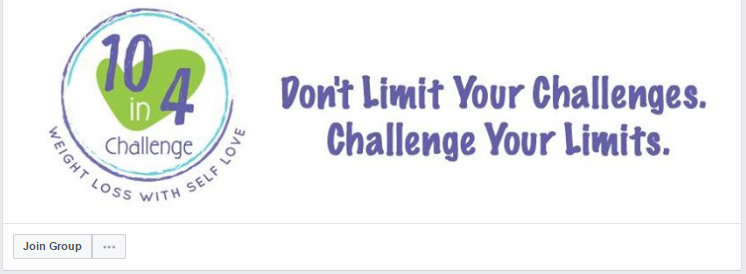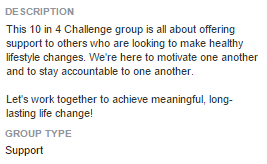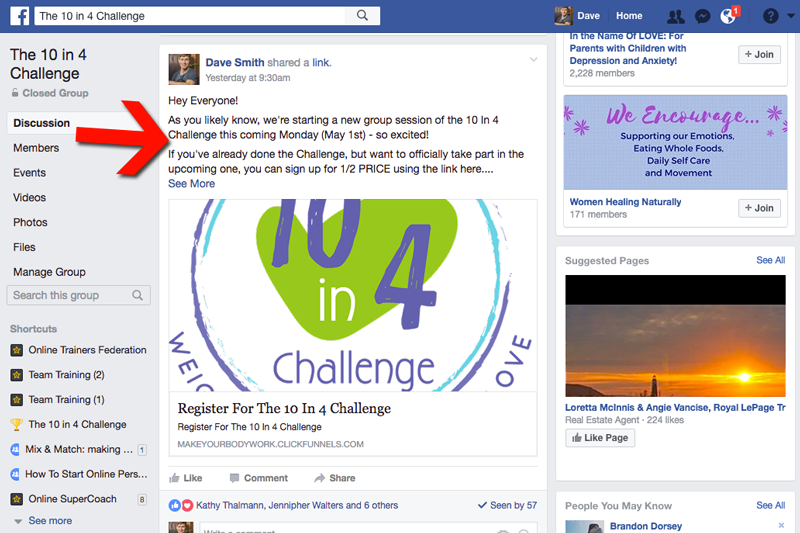Yes, you really need a private Facebook group.
As personal trainers, we need to have a solid grip on the needs and struggles that our clients face. By creating a private group, you can do just that.

For example, I manage a group for women between 35-50 years old who are looking to lose weight as part of my 10 in 4 Challenge program. Everyone in the group has the same goal: losing 10 pounds in 4 weeks, then keeping that weight off (and hopefully losing even more!).
This intimate community allows them to hold each other accountable, offer advice to each other, and motivate each other.
But that's just the start. Building the right Facebook group can do so much more for your clients AND your business.
Because of the default notification settings for any Facebook group members, every time I post within the group, all members are alerted, essentially guaranteeing that they see what I have to say.
This is perfect for advertising my other programs or products (i.e. upselling and cross-selling) that I think will benefit them in their journey.
This groups also allows me to do market research. As members post about their experiences, I can see what many of them are struggling with. This insight allows me to create new services to offer, and in turn, can bring in new streams of revenue.
Quite simply, if you don't have a private (a.k.a "closed) Facebook group for your clients and followers, you're missing out. Here are the steps you need to take to change that:
1. Create a Specific Private Group

Private Facebook groups are meant for tight-knit communities. Everyone who becomes a member should have roughly the same goals as everyone else in the group.
In other words, creating "Jay's Fitness Group For Everyone" isn't ideal. You want to hone in on your ideal clientele and foster a community build for just them.
Again going back to my group - it's for women only, of a certain age range, and is a bonus for joining my 10 in 4 Challenge program.
IMPORTANT NOTE: You cannot sell access to your private group, per Facebook’s rules! You can be permanently banned (ouch!) from Facebook if you do. Package it as a free bonus, so you don’t break the rules.
For your group, it should be specific, and the qualifications clearly explained. The more specific the group, the stronger the bond between members.
When creating the group, you have a couple options. Since this is a private group, you’ll want to choose "Closed" or "Secret."
A Closed group means that your group will be searchable and viewable by non-members, but posts will only be seen by members. People can also request to join.
A Secret group means it cannot be found and is usually invite only.
I opted to make my business Closed for advertising purposes. Closed groups can show up as suggested groups, advertising my program for free. When unqualified people request membership, it’s the perfect way to sell my services and help them become a qualified member.
2. Give Them a Guide

To preserve an encouraging and positive atmosphere, you’ll have to provide some guidelines about what can and can’t be posted. Also, post a mission statement that will keep members focused on their goals.
The most important aspect of a group is it being a healthy and safe environment for people to share. Creating guidelines, as opposed to a list of dos and don’ts, will allow full expression for your members and feels less aggressive than a list of rules.
However, this is not to say that you shouldn’t use rules. Certain lines can’t be crossed, so make sure that’s clear from the beginning (e.g. “Don’t be a jerk”; “Let’s keep content PG”).
This will keep the community on the same page and make your job easier.
3. Moderate
You may find yourself in the middle of a debate, so know how to handle it
Hopefully, with everyone working towards the same goal, you won’t need to moderate much.
But issues happen.
Sometimes members break the rules, sometimes they’re rude, or sometimes they’ll be overtly negative. My groups have been generally really good, BUT I have had dissatisfied members who vent in the group. As you likely know, people use the internet as their sounding board, so you have to act quickly when someone starts to make negative comments!
How should you handle these issues?
Remove the unfavorable content and talk to the offender in a private message. You’d be surprised how often just clearly explaining the problem to the person will solve the issue immediately. He/she will usually be apologetic, and you won’t have another problem.
Usually, people didn’t know they were breaking a rule or posted by accident. Make sure your community guidelines are clearly posted, which should prevent these situations from coming up.
4. Engage But Don’t Control
Don’t feel like you have to do it all.
As I mentioned before, one of the reasons a private Facebook group is so great is it allows members to find accountability, advice, and motivation from each other. This makes my life a lot easier for them and for YOU.
Before building my group, clients relied on me to answer their questions and concerns. I got emails all day long, text messages, and PMs on Facebook. It was a nightmare!
But with a community of like-minded individuals all striving for the same goal, they can answer the questions of fellow members because of their own experiences, and not just rely on me.
But this isn’t an excuse not to engage. Make sure you welcome newcomers and post content that will be helpful. And if someone has an issue that no one else can answer, be the hero and offer your advice.
How to Use Facebook Groups to Engage Your Customers https://t.co/X1baphKe43 #cm #smm #SocialMedia #FacebookGroups pic.twitter.com/ywzHCFS88O
— Grytics (@grytics) April 18, 2017
5. Search for Insights
Your clients are a wealth of information. Every revelation they offer in any form (e.g. obstacles, struggles, questions) is a potential service you can offer, leading to another stream of revenue. So keep tabs on their posts, comments, and discussions.
Even if you’re not overly comfortable doing this, a private Facebook group becomes the perfect place to sell these new products. Don’t be afraid to show members everything else you can offer, provided it’s relevant to issues people have posted or discussed.
Here's an example that I just had success with a few days ago. A new session of my 10 in 4 Challenge was about to begin, so I dropped the following ad in my Facebook group...

Remember, the women in this group have already done my program, BUT this little ad (that took me 10 seconds to write) generated $300 in sales that day. Happy customers are repeat customers!
The group is just as much for your clients as it is for you. So don’t forget to glean what you can from your community.
Conclusion
A private Facebook group is the ideal place to foster a community of goal-oriented people, and it’s a breeding ground of revenue for you. You can lighten your load, sell more services, and create new rivers of cash. But most importantly, you’re giving more people in this world a hope for a healthier life via a caring, tight-knit community.




